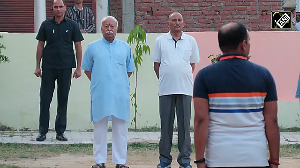'The PLA came and destroyed infrastructure in Barahoti and went back.'
'There was no change in the status quo in that region like in Eastern Ladakh.'

"We have to be vigilant along the entire LAC which has several sensitive points," says Lieutenant General Vinod Bhatia (retd) PVSM, AVSM, SM, former director general, military operations.
General Bhatia commanded a corps at the Line of Actual Control in Sikkim and an infantry division on the Line of Control.
"We have to be equally vigilant in the central sector which is where Barahoti lies and also in the Joshimath area," he tells Rediff.com's Archana Masih. The first of a multi-part interview:
As a former Director General of Military Operations who has dealt with your counterpart in Pakistan to reduce tensions on the Line of Control, what can you tell us about the corps commander talks that have been going on between India and China?
What are the pressures and responsibilities that commanders carry with them when they go for such talks with the adversary?
The Indian military functions under the direction of the Government of India. The military operates under the parameters laid down by the chief of army staff as per the Government of India. The brief is very clear and the military knows what is expected of it.
When dealing with adversaries like Pakistan or China, we know that the talks have to be professional, cordial, candid and yet constructive. Therein lies the challenge.
Soldiers talk straight. The basic training of soldiers is to fight wars, but over time they have had to learn the craft of diplomacy and statesmanship as well.
A soldier is a quick learner. He understands the requirement at the national level and at the local level. He has to ensure that the result is positive and there is convergence of outcome.
Similarly, the twelve rounds of talks between the corps commanders of India and China have resulted in disengagement in Pangong Tso and Gogra.
It will take time for full disengagement because these are very sensitive issues.
The commanders are always under pressure because they shoulder many responsibilities including the lives of their men.

How do you view the outcome of the 12 rounds of talks which have mostly been marathon sessions?
There has been no escalation after the Galwan faceoff in June 2020 and this is an ode to the Indian Army that has been deployed on the LAC.
It is a testament to the leadership and commitment of the men on the ground. The military leadership is holding the ground and simultaneously holding dialogue with the PLA in trying to come out with a solution.
One hopes that disengagement from Hot Springs will be resolved in the next rounds of talks.

The next round of talks is going to happen in the background of a fresh incident of transgression in Barahoti in Uttarakhand. Is China attempting to open another front in this sector?
The LAC is a line of perception. There is the Indian perception and there is the Chinese perception. There is no common understanding of the LAC.
On an average there are 400 transgressions on the LAC by the PLA. Transgressions have happened in the past and will continue. Yet India and China have managed the LAC well in maintaining peace and tranquility till last year.
The difference in perception is where the commanders have to play a vital role in managing the situation.
Barahoti was a transgression. The PLA came and destroyed infrastructure and went back.
There was no change in the status quo in that region like in Eastern Ladakh where they built quasi permanent structures.
Transgressions have happened and will continue to happen. We have to ensure the frequency, intensity and scope of transgressions is reduced in the years to come.
That is how you gauge the intent of the other side.
Barahoti does not have direct linkages with Eastern Ladakh. Military talks are not independent of political and diplomatic talks. Military level talks are yielding results based on the political direction.
I don't think Barahoti will have an impact on the talks.

Does that mean that the Chinese are opening another point of friction in the Uttarakhand sector?
Barahoti was always a friction point. We have to be equally vigilant in the central sector which is where Barahoti lies and also in the Joshimath area. We have to be vigilant along the entire LAC which has several sensitive points.
Feature Presentation: Aslam Hunani/Rediff.com











 © 2025
© 2025